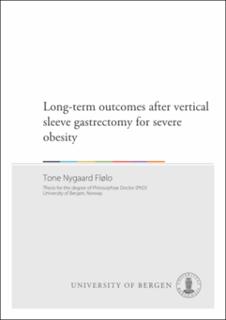| dc.description.abstract | Background: Severe obesity is a chronic disease entailed by increased risk of obesityrelated comorbidities, impaired quality of life (QOL) and early death. Causes and consequences are multifactorial and reflect an interplay between biological, psychosocial and environmental factors. Bariatric surgery has evolved as a treatment option, providing weight loss and improvements in health. Vertical sleeve gastrectomy (VSG) is the latest and most frequently performed bariatric procedure worldwide, but data on long-term efficacy is scarcely reported. Little is known about factors that can explain the variability in long-term outcome after bariatric surgery. It is necessary to identify predictors of sustained weight loss and QOL improvements for a tailored patient-centric support.
Objectives: The main objective of studies I-III was to report long-term outcomes in terms of weight, obesity-related comorbidities and QOL after VSG. Firstly, we report five-year complication and revision rates, weight loss and changes in comorbidities (primarily type 2 diabetes, hypertension and gastroesophageal reflux disease (GERD)). Secondly, previous studies found that self-efficacy may be a predictor of behavioral change and long-term health outcome. We therefor assessed the association between self-efficacy related to eating, weight loss and obesity-specific QOL five years after VSG. Thirdly, long-term reports on QOL after VSG are particularly limited. We assessed QOL broadly, covering obesity-specific and generic health-related QOL, as well as overall life satisfaction, and examined the association between weight loss and all levels of QOL five years after VSG.
Methods: Demographic, clinical and patient-reported data from three separate patient cohorts was collected prospectively up to five years after VSG. In studies I and III, the data was extracted from the local obesity surgery registry in Førde Central Hospital, while the data in study II was collected at Voss Hospital. Eating self-efficacy was measured by the Weight Efficacy Lifestyle Questionnaire Short-Form. Health-related QOL and overall life satisfaction were measured by the Impact of Weight on Quality of Life-Lite, the Obesity-Related Problem Scale, Short-Form-36 and Cantril’s ladder. All outcomes on QOL at five years were compared to population norms.
Results: In studies I-III, 168, 114 and 127 VSG patients were included with five-year participation rates of 82, 74 and 64%, respectively. Mean weight loss was profound and significant in all cohorts from baseline to five years, but modest, significant weight regain was seen between one/two and five years after VSG. In study I, complication and revision rates were low, and most obesity-related comorbidities significantly improved from baseline to five years, with a notable exception of GERD. The prevalence of preoperative GERD increased from 12 to 35% at five years after surgery. Remission rates of type 2 diabetes and hypertension were 63 and 60% at five years, respectively. In study II, changes in eating self-efficacy from baseline to one year predicted weight loss at five years, as opposed to preoperative eating self-efficacy. Improvement in eating self-efficacy from baseline to five years was associated with greater weight loss and better obesity-specific QOL at five years after surgery. In study III, clinically and statistically significant improvements from baseline to five years occurred in all three levels of QOL, with significant yet modest deteriorations seen between one and five years after surgery. Greater weight loss five years after surgery was significantly associated with improvements in obesity-specific QOL and physical health-related QOL, but not with mental health-related QOL and overall life satisfaction. All mean scores on QOL at five years after VSG were below population norms.
Conclusions: VSG is a safe and effective treatment of severe obesity. A majority of patients studied obtained enduring weight loss and improvements in health and QOL. Particular attention needs to be paid to symptoms of GERD after VSG. Still, over one third of patients experienced subsequent weight regain of 10 kg or more, and average QOL deteriorated between one or two and five years after VSG. Hence, an important minority of patients report less beneficial long-term outcomes after VSG, and some patients exhibit further deterioration in QOL compared to preoperative reports. The observed associations between eating self-efficacy, long-term weight loss and QOL, may inform tailored patient support following bariatric surgery. | en_US |
| dc.relation.haspart | Paper I: Flølo T.N., Andersen J.R., Kolotkin R.L., Aasprang A., Natvig G.K., Hufthammer K.O., Våge V. Five-year outcomes after vertical sleeve gastrectomy for severe obesity: A prospective cohort study. Obes Surg 2017; 27:1944-51. The article is not available in BORA due to publisher restrictions. The published version is available at: <a href="https://doi.org/10.1007/s11695-017-2605-x" target="blank">https://doi.org/10.1007/s11695-017-2605-x</a> | en_US |
| dc.relation.haspart | Paper II: Flølo T.N., Tell G.S., Kolotkin R.L., Aasprang A., Norekvål T.M., Våge, V., Andersen J.R. Eating self-efficacy as predictor of long-term weight loss and obesity-specific quality of life after sleeve gastrectomy: A prospective cohort study. Surg Obes Relat Dis 2019; 15(2):161-167. The article is available in the main thesis. The article is also available at: <a href="https://doi.org/10.1016/j.soard.2018.12.011" target="blank">https://doi.org/10.1016/j.soard.2018.12.011</a> | en_US |
| dc.relation.haspart | Paper III: Flølo T.N., Tell G.S., Kolotkin R.L., Aasprang A., Norekvål T.M., Våge, V., Hufthammer K.O., Andersen J.R. Changes in quality of life five years after sleeve gastrectomy. A prospective cohort study. BMJ Open 2019;9:e031170. The article is available at: <a href="https://hdl.handle.net/1956/22451" target="blank">https://hdl.handle.net/1956/22451</a> | en_US |
